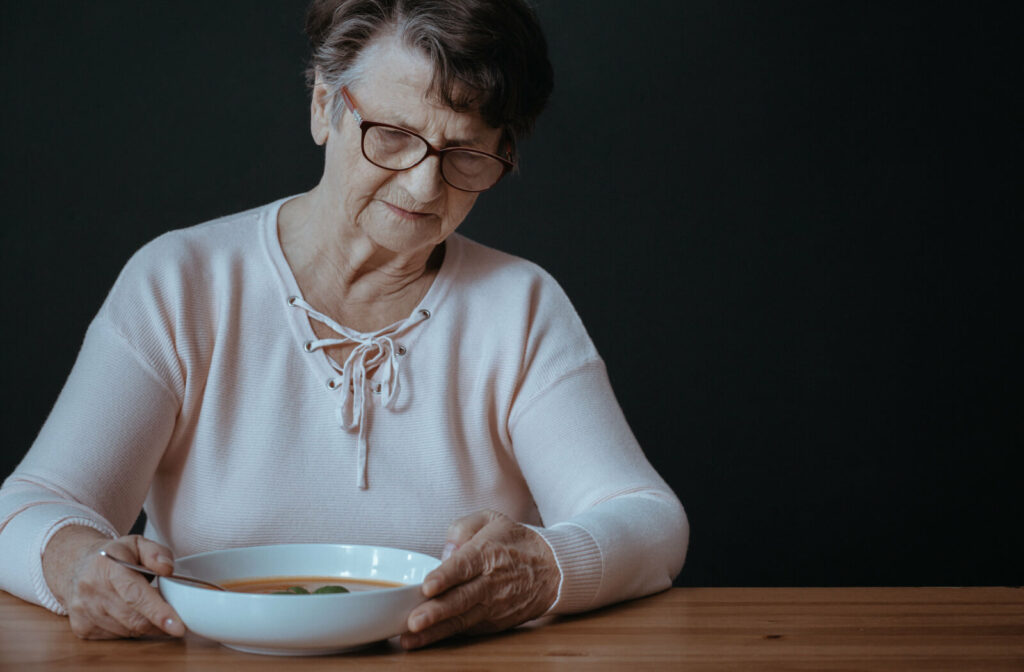Seniors often experience a decrease in appetite as they age, which can lead to a variety of health issues.
Low appetite can be caused by a number of factors, including physical and mental health issues, medications, and lifestyle changes. Many senior living communities offer services, such as physical activities and healthy diets, that can help residents increase their appetite.
It is important to understand the causes of low appetite in seniors and how to increase it.
Common Causes of Low Appetite in Seniors
As we age, our appetite can naturally decrease. However, there are a few common causes of low appetite in seniors that can be addressed. Here are some factors to consider:
1. Medication Side Effects
One of the most common causes of low appetite in seniors is medication. Many drugs prescribed for various health conditions can have side effects that affect appetite. Nausea, dry mouth, changes in taste, and even gastrointestinal disturbances can all contribute to a reduced desire to eat. Seniors should consult with their healthcare provider about any medications they are taking and inquire if they could be affecting their appetite. Adjustments to medication dosage or alternative treatments may be considered to mitigate these effects.
2. Nutritional Factors
Nutrition plays a crucial role in maintaining a healthy appetite. Seniors who do not receive adequate nutrients from their diet may experience a decline in appetite. A diet lacking in essential vitamins, minerals, and macronutrients can lead to malnutrition and a decreased desire for food. It’s important for seniors to consume a well-balanced diet rich in fruits, vegetables, whole grains, lean proteins, and healthy fats. Consulting with a registered dietitian can help develop a personalized meal plan that meets nutritional needs and encourages a healthy appetite.
3. Physical Inactivity
A sedentary lifestyle can contribute to low appetite in seniors. Lack of physical activity can result in decreased blood flow to the digestive system, which can impact hunger cues. Engaging in regular exercise, such as walking, swimming, or light strength training, can help stimulate appetite. Exercise not only improves circulation but also boosts mood, promotes overall well-being, and enhances appetite in seniors.
4. Mental Health Issues
Mental health plays a significant role in appetite regulation. Seniors experiencing depression, anxiety, or other mental health conditions may notice a decrease in their desire to eat. These conditions can affect the production of certain hormones that regulate hunger and satiety. It is essential for seniors to seek help from healthcare professionals if they are experiencing mental health issues. Therapy, counseling, and medication management can address these conditions and potentially improve appetite.
Remember, it’s always best to consult with medical professionals for personalized advice and guidance based on your specific situation. Taking steps to address these common causes can help seniors regain their appetite and enjoy a well-balanced diet for overall health and wellness.
How to Make Eating Enjoyable for Seniors
Eating can be a challenge for seniors, especially those with a low appetite. It is important that seniors get the nutrition they need and that they are enjoying their meals. To make eating enjoyable for seniors, it is important to provide nutritious meals with a variety of flavors. Eating with others can also be a great way to stimulate appetite and make meals more enjoyable.
Creating a stimulating environment with pleasant aromas and colors can also help to increase appetite. Additionally, providing seniors with a variety of options to choose from can help to make meals more enjoyable. By providing seniors with nutritious meals, a variety of flavors, social interaction, and a stimulating environment, eating can become an enjoyable experience.
Tips for Caregivers to Help Increase Appetite in Seniors
As a caregiver, it can be challenging to watch a senior loved one struggle with a lack of appetite. Fortunately, there are several steps you can take to help increase appetite.
Nutrition is key for seniors, and providing them with healthy, nutrient-rich meals can help stimulate their appetite. Make sure to include plenty of fruits and vegetables, lean proteins, and whole grains in their diet. Additionally, providing them with smaller, more frequent meals throughout the day can help them feel more comfortable and less overwhelmed.
Hydration is also important for seniors, as dehydration can lead to a decrease in appetite. Make sure your loved one is drinking plenty of fluids throughout the day, and encourage them to drink water or other healthy beverages.
Physical activity can also help increase appetite in seniors. Even light exercise, such as walking or stretching, can help stimulate their appetite. Additionally, social interaction can help seniors feel more comfortable and relaxed, which can lead to an increase in appetite. Encourage your loved one to spend time with friends and family or join a senior center or other social group.
How Brooklyn Point Senior Living Can Help
At Brooklyn Point Senior Living, we understand the importance of maintaining a healthy appetite in seniors. We offer a variety of nutritious meals and snacks that are designed to help seniors increase their appetite. Our meals are prepared with fresh ingredients and are tailored to meet the individual needs of each resident.
We also offer a variety of social activities and exercise programs that can help seniors stay active and engaged. These activities can help stimulate appetite and provide seniors with the opportunity to socialize with their peers. Our staff is dedicated to helping seniors maintain a healthy appetite and providing them with the support they need to stay healthy and active.
Get in touch with us today to learn more about how we can help your loved one maintain a healthy appetite.



